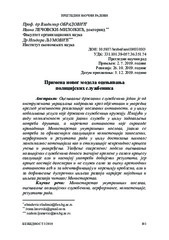Please use this identifier to cite or link to this item:
https://rfos.fon.bg.ac.rs/handle/123456789/1878Full metadata record
| DC Field | Value | Language |
|---|---|---|
| dc.creator | Obradović, Vladimir | |
| dc.creator | Lečovski-Milojkić, Ivana | |
| dc.creator | Ljumović, Isidora | |
| dc.date.accessioned | 2023-05-12T11:18:44Z | - |
| dc.date.available | 2023-05-12T11:18:44Z | - |
| dc.date.issued | 2019 | |
| dc.identifier.issn | 0409-2953 | |
| dc.identifier.uri | https://rfos.fon.bg.ac.rs/handle/123456789/1878 | - |
| dc.description.abstract | Ocenjivanje državnih službenika jedan je od instrumenata upravljanja kadrovima kroz objektivan i uporediv pregled uspešnosti realizacije poslovnih aktivnosti, a u cilju poboljšanja usluga koje državni službenici pružaju. Imajući u vidu kompleksnost usluga javnih službi u cilju zadovoljenja potreba društva, a naročito aktivnosti koje sprovode pripadnici Ministarstva unutrašnjih poslova, javila se potreba za efikasnijom evaluacijom kompetencija zaposlenih, performansi i rezultata rada u cilju dostizanja njihovog maksimalnog potencijala kao i stimulacije neprekidnog procesa učenja i unapređenja. Uvođenje savremenog modela ocenjivanja policijskih službenika donosi značajne promene u samom procesu evaluacije ali i kasnijoj upotrebi dobijenih rezultata, jer proces postaje dvosmeran i ne služi samo za ocenu prethodnih aktivnosti već i za identifikaciju i korekciju problema, ali i za definisanje dugoročnih ciljeva razvoja karijere pojedinca i ciljeva razvoja čitavog Ministarstva. | sr |
| dc.description.abstract | The evaluation of government officials is one of the HR management instruments through objective and comparable activities and performance overview to improve the quality of the services they provide. Having in mind the complexity of public services' attempts to satisfy social needs, especially the activities carried out by the Ministry of Internal Affairs, there is a need for establishing a more efficient system of employees evaluation, in order to achieve their maximum potential as well as stimulating the continuous learning and improvement process. Introduction of a modern police officers evaluation model brings significant changes in the evaluation process itself, but also in the way obtained results are used, because it becomes a two-way process and serves not only to evaluate previous activities, but also to identify and correct problems as well as to define the long-term goals of the entire Ministry. | en |
| dc.publisher | Ministarstvo unutrašnjih poslova Republike Srbije, Beograd | |
| dc.rights | openAccess | |
| dc.source | Bezbednost, Beograd | |
| dc.subject | rezultati rada | sr |
| dc.subject | performanse | sr |
| dc.subject | ocenjivanje policijskih službenika | sr |
| dc.subject | Ministarstvo unutrašnjih poslova | sr |
| dc.subject | kompetencije | sr |
| dc.subject | results | en |
| dc.subject | police officers evaluation | en |
| dc.subject | performance | en |
| dc.subject | Ministry of Internal Affairs | en |
| dc.subject | competences | en |
| dc.title | Primena novog modela ocenjivanja policijskih službenika | sr |
| dc.title | Application of a new model of police officers' evaluation | en |
| dc.type | article | |
| dc.rights.license | ARR | |
| dc.citation.epage | 119 | |
| dc.citation.issue | 3 | |
| dc.citation.other | 61(3): 101-119 | |
| dc.citation.rank | M51 | |
| dc.citation.spage | 101 | |
| dc.citation.volume | 61 | |
| dc.identifier.doi | 10.5937/bezbednost1903101O | |
| dc.identifier.fulltext | http://prototype2.rcub.bg.ac.rs/bitstream/id/529/1874.pdf | |
| dc.identifier.rcub | conv_513 | |
| dc.type.version | publishedVersion | |
| item.cerifentitytype | Publications | - |
| item.fulltext | With Fulltext | - |
| item.grantfulltext | open | - |
| item.openairecristype | http://purl.org/coar/resource_type/c_18cf | - |
| item.openairetype | article | - |
| Appears in Collections: | Radovi istraživača / Researchers’ publications | |
Page view(s)
6
checked on Dec 28, 2025
Download(s)
2
checked on Dec 28, 2025
Google ScholarTM
Check
Altmetric
Items in DSpace are protected by copyright, with all rights reserved, unless otherwise indicated.

